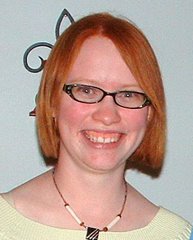From Hatchville to Namibia

By AMANDA LEHMERT
STAFF WRITER
This winter vacation, Erikka Loftfield feels overstimulated.
Her family's Hatchville home - buzzing with people to chat with and things to do - is a world away from what she has grown accustomed to in her Peace Corps outpost in Namibia.
 (Photo courtesy of Erikka Loftfield) |
''I go to the little shop there and I have one choice of peanut butter. Here, I walk around the grocery story and I don't know what to do with myself,'' Loftfield said.
The 2001 Falmouth High School graduate has been teaching English and science in the African country since 2005. This week, she returns to Namibia, where she will complete the last 11 months of her two-year commitment to the Peace Corps.
Between her pre-med undergraduate work at Cornell University and plans for grad school, Loftfield applied to the Peace Corps and was accepted to work for the U.S.-based worldwide volunteer effort.
When she was offered the job in Namibia, she did her research.
''I knew very little about Africa, actually,'' she said. ''I was very shocked about how little you can know about a part of the world.''
With a long Atlantic Ocean coastline in the western part of the country, Namibia is bordered by Angola to the north and South Africa to the south in sub-Saharan Africa. The country gained independence from South Africa in 1990.
A mostly rural country, Namibia is plagued by AIDS, with nearly 20 percent of the population affected by the deadly disease.
Loftfield's Peace Corps teaching adventure began at a secondary school in Karbib a year ago. Last spring, she moved to the little town of Bethanie, a rural community first settled by missionaries.
In a holdover from the country's domination by Apartheid South Africa, the line between black and white is distinct in Bethanie.
The blonde-haired, blue-eyed Loftfield stands out among the all-black student body. She lives in a flat at the school's hostel among about 90 students, many of whom hail from the poor outskirts of the region.
''You see more integration then there was in the past, but it's slow,'' she said of race relations in Namibia.
Loftfield teaches natural science and health, subjects that include lessons about dessert ecosystems and prevention of malaria and yellow fever.
The official language in Namibia is English, and students are taught exclusively in English after fourth grade. Still, some of Loftfield's seventh- and eighth-graders must translate for other students who have yet to master the language.
''On paper, it all works very well. But application is more difficult than that,'' she said.
She does plenty outside the classroom, too.
Loftfield runs an after-school program for girls and an AIDS-prevention program sponsored by UNICEF. The UNICEF program tries to build children's self-esteem.
''Just to get them to the point where they can say 'no' is sort of a novel idea,'' she said.
Loftfield is also among the Peace Corps volunteers who run a youth leadership camp that brings together kids from across the country so they can interact with Namibians from different tribal backgrounds.
''It's really just a venue to get kids together and realize they are working toward the same goals,'' Loftfield said.
Despite the tough work and sometimes lonely existence - Bethanie has very few residents Loftfield's age - working with the children has made her feel purposeful and welcome.
''I'll walk to school in the morning and I'm tired and grumpy, but they're happy and singing,'' she said. ''It makes it easy to be there.''
(Published: January 7, 2007)
Copyright © Cape Cod Times. All rights reserved.






No comments:
Post a Comment